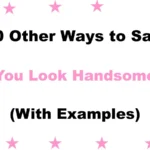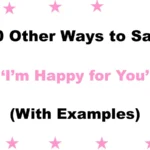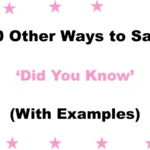Expressing respect and support for someone’s choice can deepen connections and show genuine care. Finding the right words can transform a simple acknowledgement into a heartfelt affirmation. Below are 30 thoughtful alternatives to “I respect your decision,” each accompanied by clear definitions, scenarios, and usage tips to help you communicate with warmth and authenticity.
What Does “I Respect Your Decision” Mean?
“I respect your decision” is a polite and mature way of acknowledging someone’s choice, even if you may not agree with it. It shows that you honour their right to make their own choices and are willing to accept the outcome without judgement or argument.
This phrase often reflects emotional intelligence and a willingness to maintain peace or preserve a relationship, despite differing opinions. It’s commonly used in personal conversations, professional settings, or during disagreements, as a way to express understanding, set boundaries, or gracefully step back.
When to Use “I Respect Your Decision”
Use this phrase when someone makes a choice that affects you, their team, or a shared plan. It’s ideal for personal and professional contexts where you wish to honor autonomy, such as:
- Declining an invitation
- Choosing not to proceed with a plan
- Expressing career or life choices
Is It Professional/Polite to Say “I Respect Your Decision”?
Yes. It demonstrates professional courtesy and emotional intelligence. It’s neutral and affirming, making it suitable for emails, meetings, and one-on-one discussions.
Pros and Cons
Pros:
- Shows empathy
- Maintains positive rapport
- Encourages open dialogue
Cons:
- Can feel formulaic if overused
- May come across as detached if tone is flat
Synonyms For “I Respect Your Decision”
- I Honour Your Choice
- I Value Your Judgment
- Your Choice Makes Sense to Me
- I Stand Behind Your Decision
- I’m Here for You No Matter What
- I Respect Your Autonomy
- I Salute Your Decision
- I Appreciate Your Perspective
- I Acknowledge Your Decision
- I Back Your Call
- I Defer to Your Choice
- I Trust Your Choice
- You Have My Support
- I Commend Your Decision
- I Affirm Your Decision
- I Celebrate Your Choice
- I’m Fully Behind You
- I Endorse Your Decision
- Your Decision Is Understood
- I Support Your Decision
- I Honor Your Preference
- I Grant You That Choice
- I Concur with Your Decision
- I Appreciate Your Decision
- I Yield to Your Decision
- I Applaud Your Decision
- I Respect Your Call
- I Cherish Your Decision
- I Embrace Your Decision
- I Uphold Your Decision
1. “I Honour Your Choice”
Definition: To hold someone’s decision in high regard.
Explanation: Emphasizes deep esteem for their judgment.
Example Scenario: “You’ve decided to freelance—I honour your choice and trust you’ll thrive.”
Best Use: When you admire someone’s courage.
Worst Use: If the choice is questionable or risky.
Tone: Respectful, admiring.
2. “I Value Your Judgment”
Definition: To appreciate someone’s ability to decide well.
Explanation: Highlights trust in their discernment.
Example Scenario: “Selecting that vendor was tough. I value your judgment on this.”
Best Use: In professional reviews or collaborations.
Worst Use: If the decision later proves poor.
Tone: Trusting, professional.
3. “Your Choice Makes Sense to Me”
Definition: Acknowledging logic in their decision.
Explanation: Shows you understand their reasoning.
Example Scenario: “Turning down the offer? Your choice makes sense to me given the terms.”
Best Use: When you genuinely follow their thought process.
Worst Use: If used without understanding.
Tone: Understanding, supportive.
4. “I Stand Behind Your Decision”
Definition: To fully support and defend their choice.
Explanation: Suggests loyalty and backing.
Example Scenario: “You decided to pivot the project—I stand behind your decision all the way.”
Best Use: In leadership or mentorship roles.
Worst Use: If you’re not ready to support.
Tone: Loyal, firm.
5. “I’m Here for You No Matter What”
Definition: Offering unconditional support.
Explanation: Extends beyond acknowledgment to companionship.
Example Scenario: “If you decide to move, I’m here for you no matter what.”
Best Use: With close friends or family.
Worst Use: In a formal business email.
Tone: Warm, reassuring.
6. “I Respect Your Autonomy”
Definition: Valuing someone’s self-governance.
Explanation: Emphasizes their independence.
Example Scenario: “Choosing your own schedule is your right—I respect your autonomy.”
Best Use: In collaborative settings.
Worst Use: If overused with clients.
Tone: Formal, empowering.
7. “I Salute Your Decision”
Definition: To praise their choice enthusiastically.
Explanation: Military-inspired salute of honor.
Example Scenario: “You stood up for yourself—I salute your decision.”
Best Use: With bold or courageous choices.
Worst Use: For mundane decisions.
Tone: Energetic, celebratory.
8. “I Appreciate Your Perspective”
Definition: Thanking them for their viewpoint.
Explanation: Combines respect with gratitude.
Example Scenario: “Your plan differs from mine—I appreciate your perspective.”
Best Use: In discussions with diverse teams.
Worst Use: If it sounds like placation.
Tone: Grateful, open-minded.
9. “I Acknowledge Your Decision”
Definition: Recognizing a choice has been made.
Explanation: Neutral statement of fact.
Example Scenario: “You won’t join the trip—I acknowledge your decision.”
Best Use: In documentation or minutes.
Worst Use: In emotional personal contexts.
Tone: Factual, neutral.
10. “I Back Your Call”
Definition: To support the choice they called.
Explanation: Congratulates them on making the call.
Example Scenario: “You chose Plan B—I back your call.”
Best Use: In fast-paced environments.
Worst Use: If “call” is unclear.
Tone: Casual, supportive.
11. “I Defer to Your Choice”
Definition: Yielding decision-making to them.
Explanation: Shows humility and trust.
Example Scenario: “Between the two dates, I defer to your choice.”
Best Use: When you have no preference.
Worst Use: If you should have input.
Tone: Humble, respectful.
12. “I Trust Your Choice”
Definition: Having confidence in their decision.
Explanation: Reinforces belief in their judgment.
Example Scenario: “Your career shift is big—I trust your choice.”
Best Use: With close colleagues or friends.
Worst Use: If decision is unwise.
Tone: Confident, affirming.
13. “You Have My Support”
Definition: Pledging assistance for their decision.
Explanation: Offers active help.
Example Scenario: “Leaving the program? You have my support.”
Best Use: When you can follow through.
Worst Use: If you can’t commit.
Tone: Encouraging, dependable.
14. “I Commend Your Decision”
Definition: Praising their choice formally.
Explanation: Highlights approval.
Example Scenario: “Opting out was brave—I commend your decision.”
Best Use: In written commendations.
Worst Use: Overly formal personal chats.
Tone: Formal, laudatory.
15. “I Affirm Your Decision”
Definition: Strongly confirming their choice.
Explanation: Active endorsement.
Example Scenario: “Quitting feels right—I affirm your decision.”
Best Use: In coaching or counseling.
Worst Use: If overbearing.
Tone: Supportive, assertive.
16. “I Celebrate Your Choice”
Definition: Joyfully recognizing their decision.
Explanation: Frames choice as a win.
Example Scenario: “Starting your own business—I celebrate your choice!”
Best Use: For positive, milestone decisions.
Worst Use: If choice is ambiguous.
Tone: Joyful, upbeat.
17. “I’m Fully Behind You”
Definition: Giving wholehearted support.
Explanation: Similar to “stand behind.”
Example Scenario: “You chose to relocate—I’m fully behind you.”
Best Use: With close partners.
Worst Use: In formal memos.
Tone: Warm, devoted.
18. “I Endorse Your Decision”
Definition: Officially approving their choice.
Explanation: Strong, formal backing.
Example Scenario: “Your grant proposal—I endorse your decision to submit it.”
Best Use: In professional endorsements.
Worst Use: In casual talk.
Tone: Formal, authoritative.
19. “Your Decision Is Understood”
Definition: Confirming comprehension of their choice.
Explanation: Focuses on clarity.
Example Scenario: “You’d rather wait—your decision is understood.”
Best Use: When misunderstandings are possible.
Worst Use: If it feels cold.
Tone: Neutral, explanatory.
20. “I Support Your Decision”
Definition: Offering moral or practical backing.
Explanation: Broad, flexible.
Example Scenario: “You passed on the deal—I support your decision.”
Best Use: In everyday support.
Worst Use: If vague.
Tone: Warm, reliable.
21. “I Honor Your Preference”
Definition: Respecting their personal taste or choice.
Explanation: Emphasizes individuality.
Example Scenario: “You prefer online learning—I honor your preference.”
Best Use: When tastes vary.
Worst Use: If preference is transient.
Tone: Respectful, personal.
22. “I Grant You That Choice”
Definition: Formally conceding their decision.
Explanation: Acknowledges authority.
Example Scenario: “You want to retire—I grant you that choice.”
Best Use: In senior-subordinate contexts.
Worst Use: In peer conversations.
Tone: Formal, conceding.
23. “I Concur with Your Decision”
Definition: Agreeing fully with their choice.
Explanation: Aligns your perspective.
Example Scenario: “Delaying the launch—I concur with your decision.”
Best Use: When you genuinely agree.
Worst Use: If used to avoid conflict.
Tone: Professional, affirmative.
24. “I Appreciate Your Decision”
Definition: Thanking them for making a choice.
Explanation: Combines respect with gratitude.
Example Scenario: “You chose stability—I appreciate your decision.”
Best Use: When a decision benefits others.
Worst Use: If insincere.
Tone: Grateful, warm.
25. “I Yield to Your Decision”
Definition: Submitting to their choice.
Explanation: Shows deference.
Example Scenario: “Choosing the venue—I yield to your decision.”
Best Use: When you lack expertise.
Worst Use: If you should voice concerns.
Tone: Humble, deferential.
26. “I Applaud Your Decision”
Definition: Celebrating their choice enthusiastically.
Explanation: Similar to “commend,” with more excitement.
Example Scenario: “You stood up for yourself—I applaud your decision!”
Best Use: For brave actions.
Worst Use: If tone feels exaggerated.
Tone: Energetic, celebratory.
27. “I Respect Your Call”
Definition: Acknowledging the decision they made (the “call”).
Explanation: Causal variant.
Example Scenario: “You passed on the bid—I respect your call.”
Best Use: In informal chats.
Worst Use: In formal writing.
Tone: Casual, supportive.
28. “I Cherish Your Decision”
Definition: Holding their choice dear.
Explanation: Strong emotional bond.
Example Scenario: “Moving closer—I cherish your decision to be near.”
Best Use: With loved ones.
Worst Use: If sounds overly sentimental.
Tone: Warm, affectionate.
29. “I Embrace Your Decision”
Definition: Wholeheartedly accepting their choice.
Explanation: Indicates active acceptance.
Example Scenario: “Switching roles—I embrace your decision.”
Best Use: When offering partnership.
Worst Use: If enthusiasm feels forced.
Tone: Positive, affirming.
30. “I Uphold Your Decision”
Definition: Maintaining support for their choice.
Explanation: Long-term backing.
Example Scenario: “You chose to study abroad—I uphold your decision.”
Best Use: For ongoing projects.
Worst Use: If you can’t sustain support.
Tone: Steady, committed.
Conclusion:
Whether you’re navigating a difficult conversation or simply acknowledging someone else’s choice, saying “I respect your decision” in a thoughtful way can go a long way in building trust and mutual understanding. From formal alternatives like “I acknowledge your choice” to more heartfelt phrases like “I admire your courage to choose what’s best for you,” the words you use matter. Choosing the right expression depends on your tone, relationship, and the context of the situation.
Use these alternative phrases to communicate empathy, maturity, and professionalism, especially when emotions or stakes are high. By doing so, you’ll not only show respect—you’ll also strengthen your personal or professional relationships with kindness and clarity.
FAQs
1. Why should I use alternatives to “I respect your decision”?
Using varied expressions helps your message feel more personal and avoids sounding repetitive or insincere. Tailoring your phrase to the context shows genuine care.
2. How do I choose the right alternative?
Consider the relationship and setting. For formal contexts, opt for phrases like “I honour your choice” or “I endorse your decision.” In personal conversations, warmer options like “I celebrate your choice” or “I’m here for you no matter what” work best.
3. Can these alternatives be used in professional emails?
Absolutely. Many—such as “I value your judgment”, “I concur with your decision”, and “I appreciate your perspective”—are perfectly professional yet still convey warmth.
4. What if I overuse these phrases?
Overusing any set phrase can feel formulaic. Mix in genuine commentary or follow-up questions to keep the dialogue authentic and engaging.
5. Are some alternatives better for difficult decisions?
Yes. For challenging or brave choices, use more emphatic expressions like “I salute your decision”, “I applaud your decision”, or “I commend your decision” to highlight your admiration.

Mia Rose is a passionate Language Coach and Contributor at GrammarPeaks, where she specializes in practical grammar tips and language learning strategies. With a strong foundation in education and communication, Mia brings a friendly, approachable style to her writing. Her goal is to make complex grammar rules simple and usable for learners at any level, helping them grow in both confidence and fluency.





